|
On the small but persuasive list of elements that can keep me at arm's length from even reputable movies, the terms 'child actor' and 'feel-good' sit somewhere near the top. Package the two together and I'll take some persuading to even consider watching the film. And yet I popped in the Blu-ray of The Rocket, which I had read in advance would meet both of these criteria, without a twitch of apprehension. Now why would that be? A cynical response might be that the film is set in Laos and performed in the Lao language, and that's just the sort of arty-farty nonsense that a pretentious ponce like me would blindly buy into. I can hear the jibes now. If it were an American film you wouldn't touch it. You're only watching it because it's foreign. I'll bet it's boring too. Oh man, people like you are so transparent.
If it seems I'm being cynical about an imagined cynical response, then it's at least coming from a place of awareness and experience. I've been sneered at on this score before, as I'm sure some of you reading this have also been at one time or another. And I'll freely admit that there is a grain of truth to this claim, one born of an overexposure to by-the-numbers Hollywood tales of this ilk and a presentation of childhood that is often seeped in sentimentality. Over in Sweden, meanwhile, Lukas Moodysson was making Show Me Love (correct title, Fucking Åmål), a feel-good coming-of-age movie that was an absolute joy (recently he did it again with the delightful We Are the Best! [Vi är bäst!]). There's no doubt in my mind that cultural elements play their part here, freshening up old tales by presenting familiar stories from an unfamiliar perspective. And when a new film is picked up for UK release by Eureka Entertainment, I tend to take note. This is a company run by film devotees, and they tend to be quite picky about the films they select. And The Rocket is not what I'd call a feel-good movie per se – it's ultimately uplifting, yes, but there's a lot more going on here than putting smiles on audience faces.
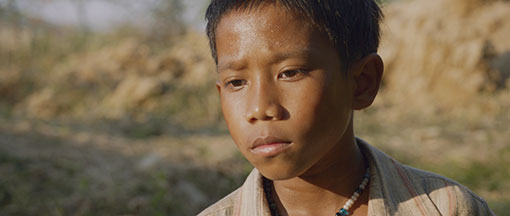
Take the opening scene. In a Laos village at night, a woman named Mali gives birth to a son under the care and guidance of Taitok, her stanchly traditionalist mother. The old woman is delighted, but her joy is cut short when Mali experiences a second set of contractions, announcing the arrival of a twin. Taitok's mood instantly darkens. In one of those grim superstitions that should be consigned to the dark ages, her people believe that when a woman gives birth to twins, one of them will be cursed and bring misfortune to its family. With no way at this early stage to determine which one of the pair carries this curse, the standard practice is to dispose of them both. But when the second baby is still-born, Mali desperately persuades Taitok to spare the first child. They thus bury the second baby and agree to keep its existence a secret, but Taitok still believes that the surviving child, named Ahlo, will bring them bad luck in the future. How's that feel-good factor sounding now?
We then hop forward ten years and find the resourceful Ahlo energetically hustling a living in the village of his birth, but the local people are facing a crisis. The government intends to build a dam that will put the area under water, and have informed the residents of the village that they will be forcibly relocated. It's a positive move, the authorities claim, one that upgrade their living standards from wooden huts to concrete structures with running water and electricity.
At this point I was irresistibly reminded of Franny Armstrong's superb documentary feature Drowned Out, in which the residents of the Indian village of Jalsindhi are faced with the very same threat to their homes. The parallels don't end there. As the villagers begin their forced relocation, Ahlo demands that they take the boat that is a symbol of his independence with them. His father Toma rejects this as impractical, but his wife stubbornly sides with her son, and the four end up hauling the boat up the side of a steep hill in the forest, and Drowned Out briefly mutates into a small-scale Fitzcarraldo. Then something happens, the sort of jarring jolt that has come of age with the assistance of CG, and Taitok's conviction that Ahlo really is a bringer of bad luck is firmly cemented.
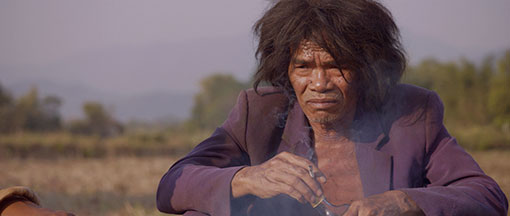
The family's misfortune continues when they reach their destination, a building site of unfinished houses and ramshackle shelters that once again reflects the real world fate of those displaced by the dam building in India.* Here Ahlo meets Kia, a girl of similar age who has her hands full looking after her uncle Purple, so named for the colourful suit he refuses to wash or remove. A wild-haired eccentric who has modelled himself on soul king James Brown and has a fondness for rice wine, Purple could in other circumstances be seen as a ready-made stock character, the engaging but ever-so-slightly batty misfit to whom our hero becomes attached and whose knowledge and wisdom will aid him in his later quest to prove his worth. But Purple is also a prime example of the subtle layering that textures the film, his knowledge of the specific danger represented by unexploded bombs prompting Ahlo to suspect that he was once a soldier. "Did you kill Americans?" the boy asks him, a reference to the CIA-sponsored action during the Vietnam war in which two million tons of bombs were dropped on his homeland, giving Laos the grim distinction of being the most heavily bombed country on earth. Astonishingly, almost a third of these bombs failed to explode, and at the end of the war there were a staggering 288 million cluster munitions and about 75 million unexploded bombs still littering the countryside,** many of them buried until uprooted by rainfall and triggered by unfortunate farm workers or children mistaking the smaller ones for toys. It's some time before Ahlo discovers the sad truth behind Purple's reluctance to answer his question, his back story economically suggested in a photograph that Purple leaves at a shrine for the young boy to discover for himself.
That the film does not develop or even fully explain these elements has drawn some criticism – you'll need some knowledge of the country's troubled history or assistance from the commentary track to fully appreciate the implication of a number of these elements – but this is detail that director Kim Mordaunt previously explored in his 2009 documentary feature Bomb Harvest. The Rocket was not intended to be a film about the social and political issues of Laos, but a specifically human story whose narrative and detail is informed by these elements. The problem for many of us is that the earlier film is not easily available – in an ideal world, the two would make a complimentary double-bill. Now there's an idea for any future special edition.
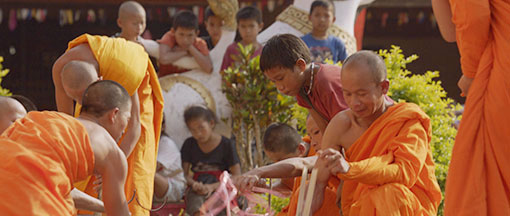
It's when the story catches up with its title that the more traditionalist base on which the layered surface has been built begins to emerge, as a cash prize being offered for the winner of a contest at a rocket festival presents the family with a chance to buy land and set up home in the village to which they have since attempted to relocate. Ahlo becomes determined to win the competition, but his grandmother is still convinced that he is a bad luck magnet and charges the reluctant Toma with the task instead. In an act of defiant determination, Ahlo storms off into the bush to make his own rocket, taking advice on the best ingredients from the knowledgeable and ever-helpful Purple. It wasn't long into this story strand, which occupies the final third of the film, that I became sure how it would end, a certainty that increased as the film moved towards its climax. Yet while I'd normally expect such predictability to hamstring the film, Ahlo and his family had been through so much by this point in the story that I found myself secretly willing director Mordaunt not to pull a last-minute twist that would rob them of their moment of telegraphed triumph.
Mordaunt's knack for visual storytelling is impressive throughout, taking a low-key naturalistic approach to a story that could so easily have fallen prey to sentimentality, of which there is barely a whisper here. Intermittently he shifts into a higher gear with memorable results, as in the energetically cross-cut sequence in which Ahlo steals electricity for Purple so that he can joyously dance to James Brown. Mordaunt also acknowledges the beauty and power of the landscape in which his story is set, and makes it as much a character of the film as the Coen brothers did in No Country for Old Men. But it's through his work with the actors – some of whom had never acted in a feature film before – that he most ably demonstrates his skills as a director. Much has been made of ex-street kid Sitthiphon Disamoe's remarkable performance as Ahlo, and with good reason, but for me he's actually outshone by young Loungnam Kaosainam's captivating turn as Kia. Rarely have I seen a child actor able to so effectively communicate so much through facial expression – there are moments when she looks at Ahlo when her sense of uncertainly, concern and affection feel astonishingly real, and seem to reflect a level of life experience that is far beyond her years. Of the more experienced performers, Boonsri Yindi is appropriately fierce and domineering as Taitok, and old hand Thep Phongam is a delight as Purple, a natural outsider whose carefree rebelliousness masks a memory-driven pain that he clearly drinks to suppress.
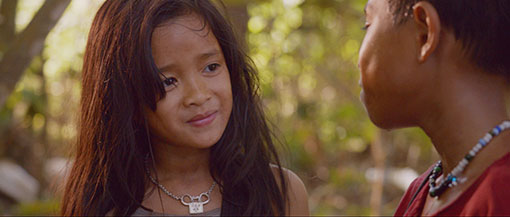
In the course of its involving and multi-layered narrative, The Rocket does push a number of familiar 'triumph against adversity' buttons, but is enriched beyond that categorisation by its sentiment-free realism, its wealth of ethnographic detail, its winning central performances, and the confidence and quiet poetry of Mordaunt's direction. In places nail-bitingly tense (there are three spectacular wind-ups involving unexploded bombs) and peppered with humorous character moments, The Rocket is as educational as it is rewarding, and deserves every ounce of praise it has attracted.
A quite lovely 2.35:1 transfer with a finely judged contrast range, a crisp level of detail and an attractive though never over-saturated colour palette. The indigo dyed cloth that is Mali's speciality is particularly (and appropriately) attractive here. Black levels are strong and there's not a dust spot in sight, as you'd expect from a modern film transfer sourced from a digital master. I've not been able to pin down whether it was shot on digitally or on film, but Andrew Commis' cinematography is handsomely presented here.
The DTS-HD Master Audio 5.1 surround soundtrack is a rich and lively mix, with excellent clarity and an inclusive – though not distracting – use of the full sound stage. The explosions are superbly rendered, being loud enough to startle but not distorting one iota, and the dynamic range is excellent, delivering crisp and precise trebles and booming bass when required.
Commentary by writer-director Kim Mordaunt
If you're not up on Laos culture and history, then this is the place to go. Although there are a few dead spots, this is still and enthralling and hugely informative look at the making of the film and the real-world people and situations that inspired the characters and story. A lot of ground is covered here, including the factual base for the film's content, the actors, the casting of locals as extras, how making Bomb Harvest inspired this production, and how specific scenes were shot. A lot of information is provided on the CIA's covert war and the sheer volume of unexploded bombs that remain in Laos. A fine companion to the film.
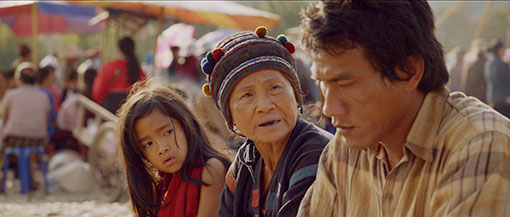
The Making of The Rocket (19:42)
Based primarily around an interview with writer-director Kim Mordaunt, who discusses the story themes, the physicality of human expression, the Laos rocket festivals and the casting process, this eventually focuses exclusively on the main actors, three of whom are briefly interviewed about their roles. There's some welcome behind-the-scenes footage, but way too many extracts from the film itself – if they were removed I'm guessing this would run for more like 12 minutes. Some good stuff here, nonetheless, not least the footage of actor Thep Phongam learning to dance like James Brown. There are also some spoilers, however, so this is definitely one to watch only after you've seen the film.
Trailer (2:25)
Pretty much the entire film compressed down into two-and-a-half minutes, most of it in narrative order, and including key shots from the final scene. Steer well clear of this before watching the film for the first time.
The Rocket is the sort of film I might have missed had it not been picked up by Eureka, in whom I have considerable faith, which was certainly justified here. Although technically an Australian production, it never feels like the work of an outsider looking in, and tells an engrossing and very human story that is by turns moving, humorous, tense and heart-warming. The film looks terrific on Blu-ray and the commentary track and featurette are both solid extras. Warmly recommended.
* According to the commentary by writer-director Kim Mordaunt, 60 million people worldwide have been, or are in the process of being, relocated as part of dam building projects.
** http://en.wikipedia.org/wiki/Unexploded_ordnance#Laos |